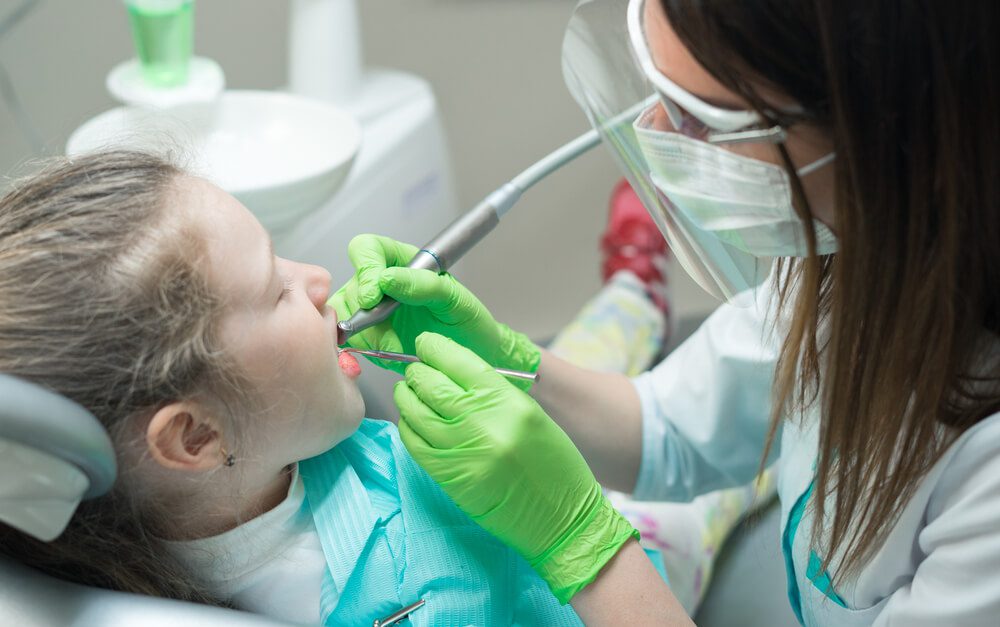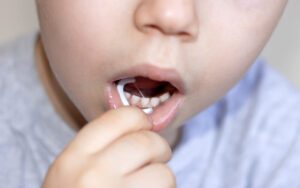Posted on April 13, 2023

Are you worried about your child’s dental health? As a parent, you want to ensure that your child’s teeth grow strong and stay healthy. However, with so many dental care products and recommendations out there, it can be difficult to know what to do.
Good dental hygiene in childhood is essential for maintaining healthy teeth as an adult. Cavities and other dental problems can lead to pain, difficulty eating, and even affect your child’s self-esteem. That’s why it’s important to start good dental habits early on.
To help you navigate the world of pediatric dental care, we’ve gathered advice from leading dentists. These tips will help you learn how to care for your child’s teeth, prevent common dental problems, and ensure that your child has a bright and healthy smile for years to come.
To care for your child’s teeth, it is important to start early with dental care. Begin by wiping your baby’s gums with a damp cloth after feeding to remove bacteria. Once teeth start to come in, switch to a soft-bristled brush and introduce fluoride toothpaste.
Supervise toothbrushing until they can do it on their own. Limit sugary and acidic drinks and snacks, and encourage regular dental check-ups. Early dental care helps your child develop good oral hygiene habits and prevent dental problems in the future.
Brush your child’s teeth twice a day, taking care to reach all surfaces of their teeth and gums. As your child grows, teach them to brush their own teeth and supervise to ensure they are doing it correctly. Regular brushing routines help prevent cavities and gum disease and promote good oral hygiene habits for life.
 Parents should begin teaching their children to floss as soon as they have two teeth that touch. Start by using floss picks or soft, flexible floss. Encourage your child to floss every night before bed.
Parents should begin teaching their children to floss as soon as they have two teeth that touch. Start by using floss picks or soft, flexible floss. Encourage your child to floss every night before bed.
Hold the floss tightly against each tooth, and gently rub it up and down in a C-shaped motion. Be sure to floss both sides of each tooth and along the gum line. Flossing helps to remove plaque and prevent cavities and gum disease.
Caring for your child’s teeth involves many factors, including the diet. To maintain good oral health, it’s essential to limit sugary foods and drinks, encourage healthy snacks like fruits and vegetables, and provide plenty of water to drink. Ensuring that your child follows a nutritious diet can help reduce the risk of tooth decay and maintain a healthy smile.
One of the most important aspects of caring for your child’s teeth is managing their sugar intake. This means limiting the number of sugary snacks and drinks they consume and emphasizing the importance of brushing and flossing regularly. To reduce the risk of tooth decay and cavities, encourage your child to choose healthy snacks like fruits and vegetables, and opt for water or milk instead of sugary drinks.
 Regular dental check-ups can help identify any potential issues, such as cavities, gum disease, or misalignment before they become more serious.
Regular dental check-ups can help identify any potential issues, such as cavities, gum disease, or misalignment before they become more serious.
It is recommended that children have regular dental check-ups at least every 6 months, or even more frequently if they have ongoing dental issues or are at higher risk for dental problems.
Regular dental check-ups are essential to maintaining good oral health and preventing any potential issues before they worsen. During these check-ups, the dentist will examine the child’s teeth and gums, clean their teeth, and check for any signs of decay or other problems. They may also provide preventative treatments like fluoride varnish to help protect the teeth from decay.
By attending regular dental check-ups, parents can help ensure their children have healthy teeth and gums for life.
Dental sealants can be applied to the chewing surfaces of back teeth to prevent cavities, while fluoride treatments can help strengthen and protect tooth enamel. It’s important to consult with a pediatric dentist for guidance on the best approach for your child’s individual needs.
When caring for your child’s teeth, coping with their teething pain can be challenging. To help ease the discomfort, you can try massaging their gums with a clean finger or providing a cold teething ring.
Giving them something to chew on, such as a soft food or silicone toy, can also provide relief. It’s also important to maintain a regular oral hygiene routine and schedule regular dental check-ups to ensure teeth are healthy and strong.
Caring for your child’s teeth involves regular brushing and flossing, as well as monitoring their habits such as thumb sucking and pacifier use. It is recommended to wean your child off the pacifier or thumb sucking by age 3 to prevent any long-term effects on their teeth, such as misalignment or bite issues.
If your child is experiencing dental anxiety, there are several things you can do to help them manage it.
As a parent, one of the most important things you can do for your child’s oral health is to model good dental habits. Brushing and flossing your teeth regularly and maintaining healthy eating habits are essential to preventing tooth decay and gum disease.
When your child sees you following these practices consistently, they are more likely to develop good habits themselves. Not only will this benefit their oral health, but it will also set them up for a lifetime of healthy habits and help prevent more serious health issues down the line. So don’t forget to lead by example when it comes to good dental habits!
In conclusion, taking care of your child’s teeth should be a top priority. Following the tips and techniques mentioned above, you can ensure that your child’s oral health is maintained, and they develop good dental habits early on.
By establishing a routine of brushing, flossing, and regular dental checkups, you can help prevent dental problems and promote a healthy smile for your child. Remember, the foundation for good oral health begins in childhood, and it’s never too early to start.
Contact Smilebliss today for more valuable information on how to care for your child’s teeth and give them the best possible start for a lifetime of healthy teeth and gums.